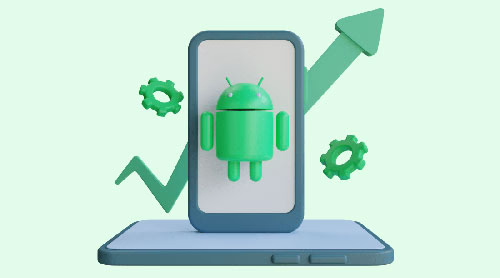 Android Mobile Development is a fascinating journey that starts with the idea and ends with a user-friendly application. It’s a process that transforms a simple concept into a powerful tool that can entertain, assist, or even revolutionize the way we live. Digitindus helps its clients in creating world class mobile applications and it follows the following steps in creating the application.
Android Mobile Development is a fascinating journey that starts with the idea and ends with a user-friendly application. It’s a process that transforms a simple concept into a powerful tool that can entertain, assist, or even revolutionize the way we live. Digitindus helps its clients in creating world class mobile applications and it follows the following steps in creating the application.
- Conceptualization: Every great app begins with an idea and this could be a solution to a problem faced by the clients and it can be a tool to make life easier. The key is to identify a unique idea that will stand out in the crowded Android market.
Designing: The next step is to design the layout of the app. This involves creating a layout of the app’s interface and deciding on the color scheme, fonts, and graphics. The aim is to create an aesthetically pleasing and intuitive design that enhances the user experience.
Development: This is where the magic happens. Using programming languages like Java or Kotlin, developers write the code that brings the app to life. They use the Android Software Development Kit (SDK) and other tools to build the app’s functionality.
Testing: Before the app is released, it undergoes rigorous testing to ensure it works as expected. This involves checking for bugs, testing the user interface, and making sure the app performs well under various conditions.
Deployment: BOnce the app is polished and ready, it’s time to launch it on the Google Play Store. This involves submitting the app for review, setting up the app’s page, and deciding on the pricing strategy.
Maintenance: After the app is launched, the work doesn’t stop. Developers need to regularly update the app to fix bugs, add new features, and keep up with changes in the Android platform.
Different Android App Development Technologies that Digitindus Technologies uses to create mobile web applications are:
- Java: Traditionally, Java has been the primary language for Android development. It’s an object-oriented language that’s robust and widely used in the industry. It offers a vast array of libraries and tools, making it a popular choice for Android developers.
Kotlin: Kotlin is a modern, statically-typed programming language that is fully interoperable with Java and Digitindus Technology makes application using this technology. It’s designed to be concise and expressive, reducing the amount of boilerplate code. Google also officially supports Kotlin for Android development, making it a popular choice for new apps.
Android Studio: This is the official integrated development environment (IDE) for Android app development. It provides powerful tools for building apps, including a code editor, debugger, and emulator. It also offers a visual layout editor for designing user interfaces.
Firebase: Firebase is a suite of cloud-based tools that can be used for various aspects of app development, including database management, user authentication, analytics, and more. It’s a powerful tool for building scalable and robust Android apps.
React Native: For developers interested in cross-platform development, React Native is a popular choice. It allows you to write code in JavaScript and deploy it on both Android and iOS platforms.
Flutter: Flutter, developed by Google, is another excellent choice for cross-platform development. It uses the Dart programming language and boasts a rich set of pre-designed widgets, enabling rapid development of beautiful apps.
SQLite: For local database storage, SQLite is often used. It’s a lightweight database engine that’s ideal for storing simple data structures directly on the device.
These technologies, when used effectively, can help developers create high-quality, user-friendly Android applications. However, the choice of technology depends on the specific requirements of the app, the team’s expertise, and the project timeline.
Android mobile development is a creative and technical process that requires a deep understanding of the Android platform, programming skills, and a keen eye for design. It’s a field that’s constantly evolving, offering endless opportunities for learning and growth.

